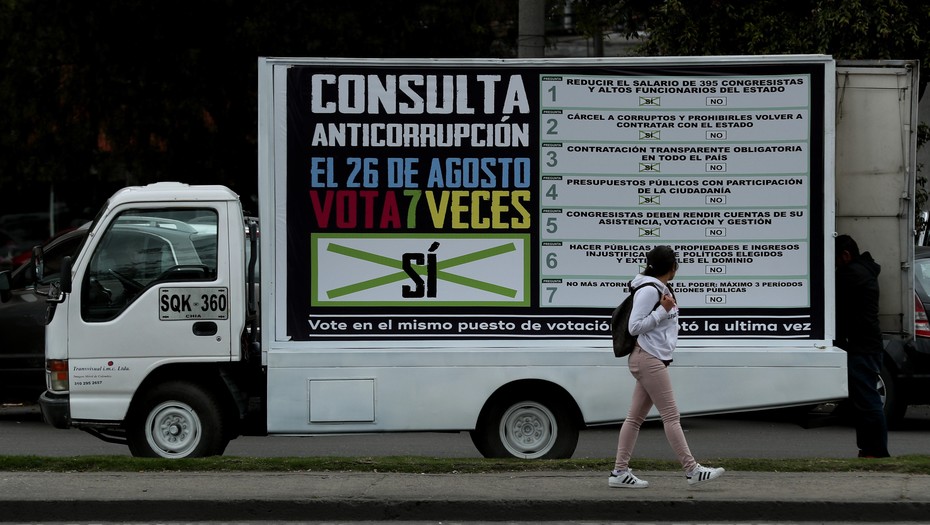Colombians didn’t vote against corruption – they mainly didn’t vote. Their indifference puts reform in the hands of the corrupt
Ah Colombia, the only country in the world to vote against peace, and then not vote in numbers great enough to tackle corruption. You could be forgiven for believing Colombians are their own worst enemy.
Colombians the length and breadth of the country complain that corruption is rampant at all levels of government, the private sector, and society at large. It is a cancer so acute that infrastructure crumbles and children die of malnutrition. But actions speak louder than words – or lack of action, to be precise. The vast majority of Colombians demonstrated on Sunday that they are too indifferent to do anything about corruption, even when presented with the opportunity to do something.
Those who did go out and vote did not even constitute one-third of the country’s electorate. Of the 36.4 million eligible voters, only a little more than 11 million turned up, meaning that more than two-thirds of the voting public did not. Turnout for Sunday’s Consulta Anticorrupcion vote was even lower than the voter turnout for the plebiscite on the FARC peace accord in October 2016.
True, that 11 million people went to the polls on Sunday without being coaxed by promises of free bus rides, lechona and tamales is a small victory in its own right. It means that people went to the polls, of their own accord, to vote for tougher punishments for the corrupt, greater transparency in Congress, and a direct say in the national budget. But alas, it wasn’t enough to reach the 12.1 million votes needed to meet quorum and make the referendum valid. But it was oh-so heartbreakingly close. Just 473 thousand votes shy.
With 99 percent support for all seven measures proposed on the ballot – had it passed, the prospect of tough new anti-corruption laws would have struck fear in the heart of the establishment – particularly the provision handing down mandatory jail sentences to those convicted of corruption. Dozens of lawmakers are currently being investigated on corruption-related charges, and many will likely stand trial. They would have faced the grim choice between years, perhaps decades behind bars, or fleeing the country and going on the lam (perhaps joining ‘el Uribito’ Andres Felipe Arias in his mansion hideout in Miami), rather than the usual house arrest and hefty fine.
If only 473 thousand more voters chose to squeeze participation in the democratic process in between attending mass and going for their extended Sunday almuerzos. Only then would we have been spared that now-familiar post-vote sinking feeling, and those pesky inappropriate thoughts that come flooding in, where mentally, you throw your hands in the air and conclude that Colombia must actually enjoy shooting itself in the foot.
Inexplicably, the tens of thousands of people went out to Sunday’s poll to vote against the seven proposed anti-corruption laws, essentially voting in favor of corruption. It’s not hard to figure out who those people are. But most of the hard-core uribista crowd (admirers of right-wing ex-president Alvaro Uribe) followed Dear Leader’s lead and simply didn’t turn up to vote.
Even more confusing is the sheer number of nullified votes (as many as 25 thousand) and unmarked ballots cast (just shy of 250 thousand in one instance). What accounts for so many people going to the trouble voting, and then simply stuffing an empty ballot into the box, without actually doing the work with the pencil, is something we’ll never understand, and that next-to-no-one here has ever took a stab at providing an explanation for.
Failed Referendum ‘A Victory’
Despite the disastrous, and, let’s face it, shameful referendum outcome, many media and political personalities spanning the full length of the political spectrum – including President Ivan Duque himself – put a positive spin on the results.
Shortly after the results became clear on Sunday night, veteran journalist Vicky Davila stated on social media: “Today the defeated are the corrupt and those who put their personal interests before the need to fight corruption. It does not matter, the politics of Colombia is changing and one day it will be a majority. The anti-corruption mandate is a fact!”
Hoy los derrotados son los corruptos y aquellos que antepusieron sus intereses personales frente a la necesidad de combatir la corrupción. No importa, la Colombia política está cambiando y un día será mayoría. El mandato anticorrupción es un hecho! #ConsultaAnricorrupcion
— Vicky Dávila (@VickyDavilaH) August 26, 2018
For her part, Claudia Lopez, ex-Green Party congresswoman and brainchild behind the anti-corruption referendum, made failure sound like victory when she tweeted: “Today we all win! The Consulta Anticorrupcion neither begins nor ends today. We wait for you on Tuesday 11am at (Congress) to file the projects that meet the citizen’s mandate so that the political class can reform and stop them from raising taxes to steal them!”
In one of his first national addresses as head of state, President Duque stated on Sunday: “It is clear that Colombia cannot stand more corruption. The fight against this scourge is a moral duty that belongs to us all: the government, the political parties, the private sector, the citizens, the Congress, (and) the control entities.”
La lucha contra la corrupción nos une como sociedad. Invito a los colombianos a no descansar en este propósito común. Todos jugamos un papel importante para combatirla. #ConsultaAnticorrupción pic.twitter.com/lQoq4O9Ucd
— Iván Duque (@IvanDuque) August 27, 2018
Somewhat surprisingly, even Claudia Gurisatti, director of the right-wing and Uribe-friendly RCN and NTN24 news networks, tweeted her support of the anti-corruption referendum: “Little was missing but much was achieved. A very high threshold and a vote of more than 11 million 600 thousand votes are a clear message. Now President Duque should push the anti-corruption reform before congress.”
If Duque is as serious about fighting corruption as he says he is, he has a 15-day window in which to ratify some or all of the proposals by presidential decree. He is, however, unlikely to do that, and instead work with his party’s majority in Congress to table some other anti-corruption bill – only for it to be watered down, made toothless, and the vote on it delayed for weeks or months by some procedural trickery.
And that, my friends, is the best-case scenario.
Another more likely scenario is that Uribe – the president’s spiritual leader, who has repeatedly spoken out against the anti-corruption referendum ever since his hand-picked man (Duque) won the presidency – pulls on the choke-chain and reins the new president in. Even if Duque dares break ranks with Uribe and pushes ahead with real reform on corruption, if it’s not to Uribe’s liking, he will simply order his personality-cult of a political party to vote down or block any attempt to move it forward.
And like any good narcissist, Uribe has made what he called the “deceptive” anti-corruption vote all about himself. Here, he accuses Claudia Lopez of pushing for the slate of proposals to combat corruption in a referendum as some sort of attack against him personally:
“Ms. Lopez spends 300 thousand million (pesos) for me to show my income statement, ignoring that I have given those all my life, the Congress has my statement of assets and I have taken care with transparency and austerity State resources,” Uribe said.
La sra López hace gastar 300 mil millones para que yo muestre la declaración de renta, ignora que he entregado las de toda mi vida, el Congreso tiene mi declaración de bienes y he cuidado con transparencia y austeridad los recursos del Estado
— Álvaro Uribe Vélez (@AlvaroUribeVel) August 26, 2018
But who knows what’s about to happen? Duque has made the noises of a man who thinks for himself and isn’t simply at Uribe’s beck-and-call. Perhaps the puppet-master has got the strings in a knot, and Duque will go the way of open defiance in much the same way ex-president Juan Manuel Santos did in his first term.
But that’s not the point. The point is that by willfully abstaining from the democratic process, the Colombian people have squandered what little collective power they have over those who govern them. Widespread apathy simply hands power back to those who use it to raid the public coffers every chance they get.
Real reform in fighting the scourge of corruption in Colombia will now only happen if Duque grows a spine, takes on his own party and its demagogue, and resists the urge to sign any toothless and cosmetic version of reform into law. We all now must sit and watch; through their inaction and indifference, Colombians have willingly resigned themselves to the role of spectator.

Journalist. Misfit. Malcontent. Provocateur. Is a better Colombia is possible? We’re starting to have doubts.


This wringing about a vote to empower Bogota is ill-place. Change occurs when people in their hearts, families, and churches commit to truth telling, and respecting their neighbors and their neighbors property. Change occurs not flowing down from Bogota, but when sufficient number of Cafeteros look in the mirror and turn from selfishness, love God and neighbor.
Pingback:When Corruption in Colombia is a Matter of Survival | MiKolombia.com
What was the process leading up to the referendum? How was information disseminated, and who had access to the information? Was transport provided for those who needed it, such as those who may live in different cities from the one in which they are registered to vote? The answers to those questions could either support or negate your comment that Colombian citizens are “willfully” abstaining from the democratic process. I think it is worth looking further into how different populations voted, who abstained, who didn’t, etc.